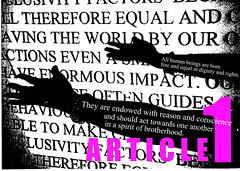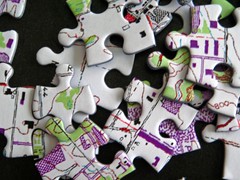As I near putting together my Lit Review and 1 unit to implement before the end of the semester, I consider much of the following:
1. How do I demonstrate all of what I learned, through research and trial and error in my classroom? Will a lit review, blog and sample unit cover this?
2. How will I implement what I have learned in my future classes and profession?
At this point, I really feel like I have been a curator of knowledge. Several things have culminated in the last several weeks to come to this conclusion, but it leaves me with more research questions. So.. how to document all of this? Well that is another research question in and of itself. I would prefer to document as a curator, but my experiences must also be accounted for in this learning process. A curator of my own blog?
Well that leads me to the next question, what are the pieces of the puzzle to reach the learning goal, and then I can figure out how to display and demonstrate my learning:
The pieces of the Puzzle:
1.
“Focusing on specific digital tools instead of on the instructional skills they're designed to support often leads to poor technology integration.” (Feritter, 2011 p. 84)
2. "Undoubtedly, many appreciate this new resource—it’s yet another tool they have available to them—but I suspect the overwhelming majority of them will tell you this does not solve the most important issues they face in trying to reach students.
Even better, ask any group of students. They will tell you. They show up at school and attend the standard fare of required classes. The curriculum in these classes is typically irrelevant to their lives, except for the need to earn grades good enough to placate their parents and impress college admissions officers. When the academic content assigned has no meaning to them, and their engagement with it is solely to attain extrinsic rewards, of course they’re not going to retain it" (Miranda, 2011)
3. “Educators and scientists repeatedly return to the conclusion that one advantage of educational games is that games tend to generate a much higher level of students’ positive emotional engagement, thus making the learning experience more motivating and appealing (Rieber et al., 1998), improv- ing participation and achievement (Jayakanthan, 2002). Games can motivate passive students to contribute more than they would in a traditional learning environment (Tanner & Jones, 2000). Video games motivate learning by challenging and providing curiosity, beauty, fantasy, fun, and social recognition. They reach learners who do not do well in conventional settings (Dede, 2004)” (Anetta 2008, p.233).
4. “Because of their rich storylines, video games easily lend themselves to established instructional practices such as problem-based learning” (Anetta, 2008 p. 234).
5. Having just
completed Planet Z, I have found that my students were very engaged in the simulation and storyline of attempting to help another planet solve their environmental problems, designed using the Wiggins and Mctighe's Backwards Design Model. They were asked to analyze data and evaluate if there was a problem, and if so what was causing it, which was presented as a poster and model to
Mr Z. from Plane Z. I also feel that we have drawn out many of the misconceptions that have occurred with typical science and have spent more time acting as scientists then "classroom students." I feel that it was a very successful project, and my students learned a great deal more about Earth Systems and Global Warming then had I just had them read about it and watch a video.
6. Creating a safe and positive classroom where autonomous learning can bloom. (I have one student that utilizes her textbook as reference material, when ever she does not know something. I have another student who has amazing art skills and can explain her understanding of concepts through art.)"Many teachers fear that giving students more choice will lead to their losing control over classroom management. Research tells us that in fact the opposite happens. When students understand their role as agent (the one in charge) over their feeling, thinking, and learning behaviors, they are more likely to take responsibility for their learning. To be autonomous learners, however, students need to have some choice and control. And teachers need to learn how to help students develop the ability to make appropriate choices and take control over their own learning." (McCombs 2011)
So how do these pieces fit together, and what is the picture for the puzzle at the end? I know the simulation was very engaging, though challenging for the students. A great deal of deeper learning occurred, so how can I utilize the concept of game design into this process? Should I?
I definitely have come to the conclusion that any type of instruction can no longer be piece-meal. It must have the components of connecting to students lives and interests, in other words being meaningful. It also must be able to support an engaging storyline to move students through the simulation with results similar to real-world results. Finally, it must incorporate components in which students see their learning success and value their learning. The learning targets must be openly discussed and analyzed. This means utilizing technology for supportive tutorial learning, when initial concepts are not reached by all of the students, but are in need of being applied into the project. Thus the flipped classroom concept becomes beneficial for anytime, anywhere learning.
Students need to know that they have control of their learning and can be inspired to be open and ask questions for curiosity sake. To not be discouraged due to misconceptions or inability to present their ideas in the classroom. The classroom dynamics to make all of this happen are difficult, and a supportive positive classroom of team work and happiness must exist.
Ferriter, W.M. (2011). Good Teaching Trumps Good Tools. Educational Leadership V. 68 no.5, p.84-5
Miranda, S. (2011, November 6). Re-educate Seattle: Khan Academy does not constitute an education revolution, but I’ll tell you what does; Retrieved from http://stevemiranda.wordpress.com/2011/11/06/khan-academy-does-not-constitute-an-education-revolution-but-ill-tell-you-what-does/
Anetta, L. A. (2008). Video games in education: why they should be used and how they are being used.
Theory Into Practice,,
47, 229-249. DOI: 10.1080/00405840802153940
McCombs, B. (2011) American Psychological Association: Developing Responsible and Autonomous Learners: A Key to Motivating Students. Teacher’s Modules. Retrieved from: http://www.apa.org/education/k12/learners.aspx


